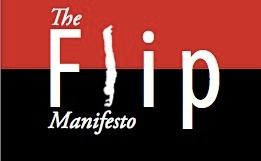The Flip Manifesto – Daniel H. Pink

“The Flip Manifesto” presents a vision for transforming the way we work and live by embracing the principles of autonomy, mastery, and purpose. The central idea of the book is that the traditional model of work, where employees are expected to comply with strict rules and regulations, is becoming outdated and that a new model based on flexibility, creativity, and self-direction is emerging.
Autonomy
Pink argues that autonomy, or the ability to direct one’s own life and work, is essential for motivation and high performance. He cites research showing that people who have control over their work are more engaged, more productive, and more satisfied than those who don’t.
Intrinsic motivation
Pink explains that intrinsic motivation, or the drive to do something for its own sake rather than for external rewards, is more powerful than extrinsic motivation. He cites research showing that people who are intrinsically motivated are more creative, more persistent, and more satisfied than those who are extrinsically motivated.
Mastery
Pink contends that the pursuit of mastery, or the desire to become better at something that matters, is a key source of fulfillment in life. He cites research showing that people who are engaged in challenging and meaningful work are happier and more satisfied than those who aren’t.
Self-directed learning
Pink contends that self-directed learning, or the ability to learn and adapt on one’s own, is essential in a rapidly changing world. He cites research showing that people who are able to learn new skills and adapt to new situations are more successful and more satisfied with their work.
Purpose
Pink argues that having a sense of purpose, or the belief that one’s work has a larger meaning or significance, is crucial for a meaningful life. He cites research showing that people who feel that their work is important are more engaged, more productive, and more satisfied than those who don’t.
Motivation 3.0
Pink introduces the concept of “Motivation 3.0”, which is based on autonomy, mastery, and purpose, rather than the traditional carrot-and-stick approach. He argues that Motivation 3.0 is more effective in today’s knowledge-based economy, where creativity, innovation, and problem-solving are key.
The importance of autonomy-supportive environments
Pink emphasizes the importance of creating autonomy-supportive environments, where people are encouraged to take ownership of their work and pursue their own interests. He cites research showing that such environments can foster intrinsic motivation and lead to higher levels of engagement and performance.
Results-only work environment (ROWE)
Pink discusses the concept of a results-only work environment (ROWE), where employees are evaluated based on their performance rather than their presence in the office. He cites research showing that ROWE can increase productivity, reduce stress, and improve job satisfaction.
Flat organizations
Pink argues that flat organizations, where there are few or no hierarchical levels and employees have more autonomy, can increase creativity and innovation. He cites research showing that flat organizations can lead to more diverse perspectives, faster decision-making, and more collaboration.
